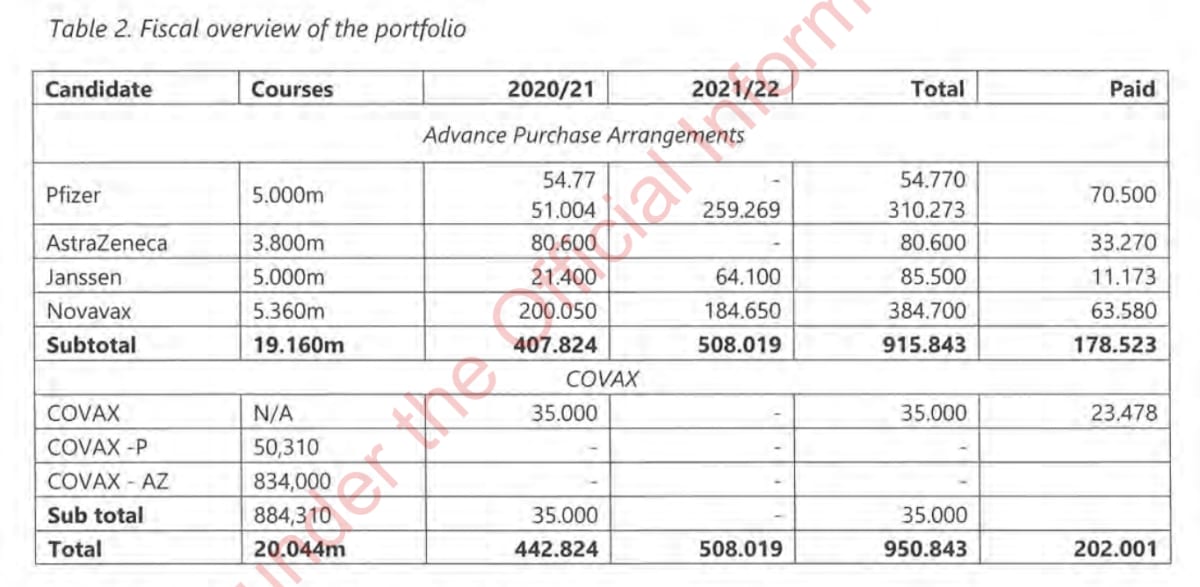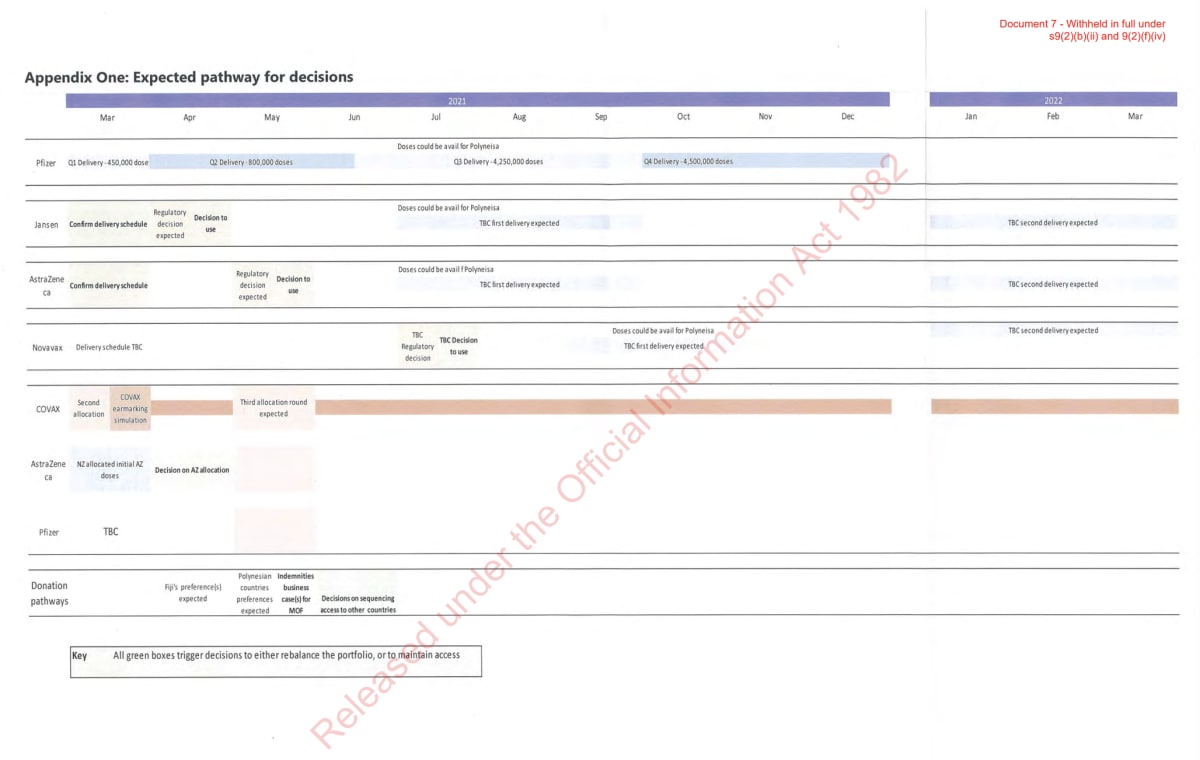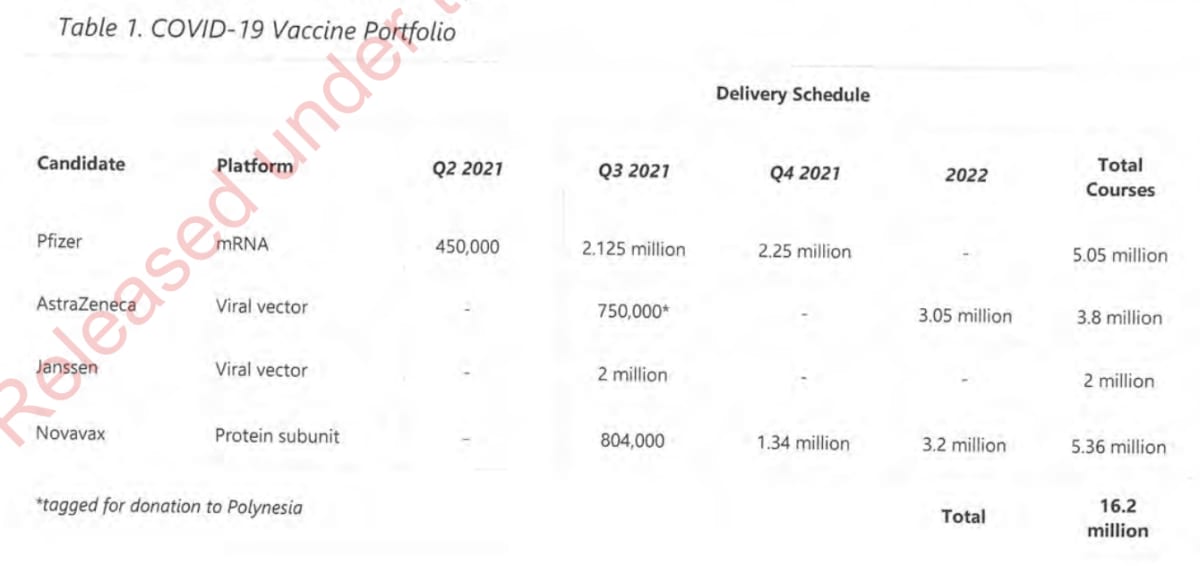
Documents obtained by Newsroom under the Official Information Act reveal the numbers the Government has been trying to keep secret - how much New Zealand paid for its vaccines, Marc Daalder reports
Newsroom can reveal that the Government expected to spend $36.50 per dose of the Pfizer vaccine for the general rollout - and earmarked nearly $1 billion for all of the vaccines in its portfolio.
Details of New Zealand's contracts with vaccine manufacturers have been tightly controlled since 2020, when the agreements were first signed. Efforts to access the agreements have been fiercely resisted by the Government.
However, Covid-19 Response Minister Chris Hipkins has mistakenly supplied Newsroom with three unredacted documents concerning New Zealand's vaccine portfolio in response to an Official Information Act request. The documents, which date back to March, April and May of 2021, were provided despite being listed as withheld.
An April vaccine portfolio update included a "fiscal overview of the portfolio". This noted that more than $950 million had been earmarked to purchase vaccines, if the Government's $35 million donation to the COVAX fund was included.
Read Newsroom's two-part investigation into vaccine purchasing: * Was New Zealand too slow? * How NZ almost turned down Pfizer
The 10 million doses of Pfizer vaccine that had been directly purchased from the manufacturer would cost a total of $365 million - or $36.50 per dose. In late March, that worked out to about US$25.50, roughly on par with what other countries paid for the vaccine. Israel was reported to have spent US$23.50 per dose. The United States and the European Union both spent less than US$20 per dose for the initial rollout but are now paying around US$24.
The Government had also agreed to pay $80.6 million for AstraZeneca vaccines ($10.60 per dose) and $384.7 million for Novavax jabs ($35.89 per dose). It had earmarked $85.5 million for Janssen's one-shot vaccine, which was therefore worth about $17.10 per shot.
However, the April update also asked ministers to authorise a decision not to purchase three million of the five million Janssen doses the supply agreement had reserved for New Zealand.
These vaccines were no longer needed in light of delivery schedules received from Pfizer and would become a liability if the country had to resell or donate them.
In addition, Cabinet agreed in principle to hold 100,000 doses of Pfizer vaccine purchased through the COVAX facility for the Cook Islands and Niue.
In June, the Government instead chose to keep those doses for domestic use as the vaccine rollout nearly ran out of doses.
A delivery schedule appended to the April paper shows Pfizer's deliveries were expected throughout the year, while other vaccines were only due at the end of 2021. AstraZeneca doses had already been postponed to 2022 by Cabinet at this stage, though officials asked ministers to consider bringing forward the delivery of 750,000 courses for donation to Pacific Island countries.
A separate May briefing asked Cabinet whether delivery of Novavax's protein subunit vaccine should be deferred to 2022. Officials said 4.2 million doses were due in 2021 - subject to regulatory approval - but that they might not be needed as the Pfizer rollout progressed.
Instead, they could be held over to the next year where they might be used as boosters or to fill gaps in the portfolio. Novavax had also reached out to New Zealand to offer an update to the contract allowing us access to any updated versions of the vaccine (which could tackle new variants or be universal for all variants) if we chose to delay receipt.
That May update also provided further clarity on anticipated delivery schedules.
Hipkins in August refused to release the agreements to Newsroom despite an Official Information Act request, citing commercial sensitivity. That case is now before the Ombudsman. In separate cases where requesters sought pricing and delivery details from New Zealand's vaccine agreements, the Ombudsman decided that releasing the information would be too damaging to New Zealand's public interest.
"There was a very real risk that making that information available would have an adverse impact on the security of New Zealand’s Covid-19 vaccine supply, both now and for the future. The potential consequences should New Zealand’s access to Covid-19 vaccines be compromised would be severe," the Ombudsman concluded.
The prices that numerous other countries paid for their vaccines are publicly available and there is no evidence that these countries experienced any retribution as a result of the release.










